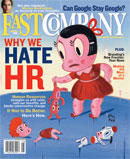 Whether you agree or not, chances are you'll find this article very thought-provoking. Briefly, it indicts HR on four counts: (1) HR people aren't the sharpest tools in the box, (2) HR pursues efficiency in lieu of value, (3) HR isn't working for you (the employee), and (4) the corner office doesn't get HR (and vice versa).
Whether you agree or not, chances are you'll find this article very thought-provoking. Briefly, it indicts HR on four counts: (1) HR people aren't the sharpest tools in the box, (2) HR pursues efficiency in lieu of value, (3) HR isn't working for you (the employee), and (4) the corner office doesn't get HR (and vice versa).Personally, I love the article. And so just in case you're put off by its blatant hostility, I would like to take this opportunity to direct you to some related (and utterly civilized) items worth reading.
First, What Gets Measured Gets Done: Developing an HR Scorecard. This piece bemoans the disconnect between HR and business strategy (essentially points (2) and (4) above) and outlines a balanced-scorecard type of approach to mediate between the two.
Second, Watson Wyatt's Human Capital Index. Here we see intriguing evidence showing human capital as a leading indicator of value creation. In other words, good HR drives financial results more so than the other way around.
As interesting as that headline is, I am much more struck by the body of the Watson Wyatt report. They break down human capital into six sub-categories, each of which is further itemized, and then discuss the return on investment of HR effort put into each category (and each item). Most HR objectives correlate with increased market value (showing flexibility in work arrangements, for example). But some popular HR objectives correlate with decreased market value. Quoting from the report:
"We found that three practices in particular---360-degree review, longer-term developmental training, and implementing HR technologies with "softer" goals in mind---were often associated with a decrease in market value. Our hypothesis is that, while there is nothing inherently wrong with these practices, many organizations implement them in misguided ways. In these areas, companies must pay special attention to strategic alignment and appropriate execution."
They go on to say, "Multisource feedback continues to enjoy mass popularity, and many, if not most, businesses report that they feel it is successful." And yet evaluating superiors and evaluating peers are linked to a significant decrease in market value. "The truth is that it is a challenge to get multisource feedback right. It succeeds when an open culture is already in place. It succeeds when participants have been well trained to give and receive feedback. It succeeds when there is valid and reliable intrumentation and appropriate follow-up. When one or more of these elements is missing, multisource feedback can be a lengthy distraction that interferes with teamwork and reduces productivity and, ultimately, shareholder value."


2 comments:
As a professor of HR at the Univ. of Mumbai, India, I often alert my students on these areas. I really liked the article.
Great Blog, check out this business. This is the Goose that lays you Golden Eggs! business home party supply
Enjoy!
Post a Comment